|
|
|
Sort Order |
|
|
|
Items / Page
|
|
|
|
|
|
|
| Srl | Item |
| 1 |
ID:
119218
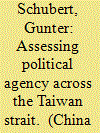

|
|
|
|
|
| Publication |
2013.
|
| Summary/Abstract |
The migration of Taiwanese to the Chinese mainland is one of the most striking features of the deepening interaction and integration across the Taiwan Strait. Among these newcomers, Taiwanese businesspeople (taishang) have long since been considered an important 'linkage community' that profoundly affects the dynamics of cross-Strait relations. However, to what extent can and do they exert political agency in cross-Strait relations? Drawing on recent literature, as well as fieldwork conducted between 2006 and 2009 in Taiwan, the Pearl River Delta (Dongguan), and the Kunshan-Shanghai metropolitan area, this article begins by analysing the political mindset of the taishang, most notably with respect to their understanding of themselves as political actors. It then looks at different dimensions of political agency exercised by the taishang in both China and Taiwan. Since little is known about their strategies to politically safeguard their group-specific interests, the findings and assessments presented here can only be preliminary. Nevertheless, the article contributes to a better understanding of the concept of linkage community and provides a useful foundation for further investigations of the taishang's political role in shaping cross-Strait relations.
|
|
|
|
|
|
|
|
|
|
|
|
|
|
|
|
| 2 |
ID:
095666
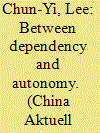

|
|
|
|
|
| Publication |
2010.
|
| Summary/Abstract |
This paper focuses on the changing interaction between Taiwanese entrepreneurs and local Chinese governments. Through the analysis of this changing process, it can be seen that Taiwanese businesses are a special "asset" of Chinese governments. The main argument of this paper is that both central and local governments in China have strategic considerations in respect of Taiwanese businesses. The Chinese central government values Taiwanese businesses because more Taiwanese investment in China strengthens the Beijing government in negotiations with the Taibei government. Nevertheless, since the Kuomintang (KMT) (Guomindang) regained power in 2008, the strategic value of Taiwanese businesses in the cross-Strait relationship seems to have decreased. The central government has created a profitable macro-environment enabling local officials to give a warm welcome to Taiwanese businesses. Chinese local governments value Taiwanese businessmen not only because of the central government's deliberate policy but also because they are pursuing their own self-interest. This paper firstly focuses on the changing interaction between Taiwanese businesses and Chinese local governments. It then further analyses the different but complementary interests of both central and local governments in China in relation to Taiwanese investors.
|
|
|
|
|
|
|
|
|
|
|
|
|
|
|
|
| 3 |
ID:
116630
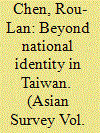

|
|
|
|
|
| Publication |
2012.
|
| Summary/Abstract |
This article conceptualizes the multifaceted concept of national identity in Taiwan. The prevailing measures on national identity were ubiquitous, one-dimensional, and categorical, forcing people to choose between being Taiwanese and being Chinese or opting for independence or unification. Conceptual haziness leaves us ill equipped to examine the essence of Taiwan's identity politics. Hence, this article goes beyond national identity to explore the dimensionality that underlies its nature.
|
|
|
|
|
|
|
|
|
|
|
|
|
|
|
|
| 4 |
ID:
117778
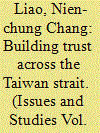

|
|
|
| 5 |
ID:
138127
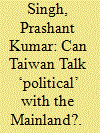

|
|
|
|
|
| Summary/Abstract |
An investigation into the prospects for including political talks in the cross-strait dialogue enables a better assessment of cross-strait relations. China’s push for political talks and Taiwan’s resistance to them imply that their political positions on the fundamental issues of sovereignty and ‘living space’ for Taiwan remain unchanged. Considering Taiwan’s complex domestic political scenario, which is largely against unification with Mainland China, the likelihood of Taiwan agreeing to political talks for unification is remote. While the ruling Kuomintang extends qualified support for political talks, the opposition parties reject them outright. In addition, deepening popular anxiety against closer cooperation with Mainland China further constrains prospects for political talks.
|
|
|
|
|
|
|
|
|
|
|
|
|
|
|
|
| 6 |
ID:
095670
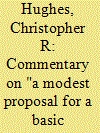

|
|
|
|
|
| Publication |
2010.
|
| Summary/Abstract |
This critique assesses Prof. Chang Ya-chung's draft basic agreement for cross-Strait relations by arguing that it overstates changes in Beijing's Taiwan policy, which is based on a strategy that has not seen substantial change since it was devised in the early 1990s to prevent the island's democratization leading to the exercise of self-determination. By over-estimating Taiwan's political, diplomatic, military, and economic vulnerability the proposal unnecessarily narrows down Taibei's options to the point where it has to accept Beijing's one-China principle. This merely closes off other options that Taiwan can just as readily pursue, such as continuing to develop cross-Strait relations through ad hoc solutions to practical problems or seeking more imaginative ways to create a durable modus vivendi with international support. Even more problematic is that a political framework for stability based on the principles of Chinese nationalism is unlikely to be acceptable for Taiwan's liberaldemocratic politics and could thus amount to an unnecessary risk that would lead to a less durable cross-Strait status quo than that which has been maintained over the last two decades.
|
|
|
|
|
|
|
|
|
|
|
|
|
|
|
|
| 7 |
ID:
095671
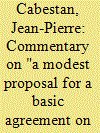

|
|
|
|
|
| Publication |
2010.
|
| Summary/Abstract |
The main question that Chang Ya-chung's Modest Proposal triggers is whether a political and security agreement can realistically be reached today. The twelve agreements signed by Beijing and Taibei since 2008 should be saluted as conducive to constructing détente, nonmilitary confidence-building measures and de facto government-togovernment relations across the Strait. However, in the foreseeable future, is it realistic to ask for more? Actually, a temporary or long-term political agreement between Taibei and Beijing will not be reached if the People's Republic of China (PRC) and the Republic of China (ROC) refuse to formally recognize each other's separate existence and sovereignty in one way or another, at least tacitly, and if they do not agree to address security issues squarely with the assistance of the USA. Finally, no meaningful agreement can be reached either if the PRC Chinese and certain segments of the Kuomintang (KMT) (Guomindang) fail to recognize Taiwan's specific history or realize that the Taiwanese have been developing a distinct identity since 1949 and even more so since the island's democratization took place in the late 1980s.
|
|
|
|
|
|
|
|
|
|
|
|
|
|
|
|
| 8 |
ID:
123578
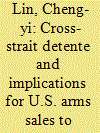

|
|
|
| 9 |
ID:
104225
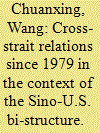

|
|
|
|
|
| Publication |
2011.
|
| Summary/Abstract |
Cross-strait relations over the past 30 years can be divided into three different time periods, which correspond to changes in the Sino-U.S. bi-structure in terms of materialist structure and idealist structure. In other words, although changes in Taiwan itself have affected cross-strait relations they are subordinate to changes in the Sino-U.S. bi-structure.
|
|
|
|
|
|
|
|
|
|
|
|
|
|
|
|
| 10 |
ID:
114797
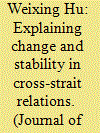

|
|
|
|
|
| Publication |
2012.
|
| Summary/Abstract |
Relations across the Taiwan Strait have experienced several cycles over the last 60 years. Tension and crisis seem to come and go, followed by periods of peace and stability. What explains the cyclical pattern of change and stability? How can we explain the sources of change and stability in the relationship? This article examines the last 60 years of cross-Strait relations in light of an interpretative framework of 'punctuated equilibrium'. Cross-Strait relations are complex, consisting of actors at the domestic, cross-Strait, and international levels. With a high degree of economic interaction, the cross-Strait relationship can be characterized as economic integration cum political impasse. This article analyzes the cyclical changes through three causal factors: (a) the role of issue cycles in cross-Strait relations; (b) the impulsive drivers for change; and (c) the structural constraints dampening change.
|
|
|
|
|
|
|
|
|
|
|
|
|
|
|
|
| 11 |
ID:
119219


|
|
|
|
|
| Publication |
2013.
|
| Summary/Abstract |
This article looks at Ciji (Tzu Chi), a Taiwanese Buddhist charity which has been active in China since 1991. Ciji's presence in China is all the more remarkable in view of outbreaks of crises in relations across the Taiwan Strait as well as the religious nature of the organization. The article first addresses the issue of Taiwan's soft power in its relations with China and suggests the possibility that Ciji's activities in Taiwan have shown China the benefits of a liberal policy towards religion in that charitable activities carried out by religious organizations complement the government's social policies. The second section chronicles Ciji's presence in China since 1991 and shows that local governments have their own reasons for welcoming Ciji's volunteers. The third section compares and contrasts state approaches in China and Taiwan with respect to the provision of social services by religious organizations and notes that even if local governments in China are learning about the benefits of a more open policy in their dealings with Ciji, the central government has not adopted the liberal approach of the Taiwanese government in the regulation of religion.
|
|
|
|
|
|
|
|
|
|
|
|
|
|
|
|
| 12 |
ID:
113722
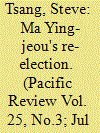

|
|
|
|
|
| Publication |
2012.
|
| Summary/Abstract |
Ma Ying-jeou's re-election means that there will not be a leadership change in Taiwan, but it still has significant implications. It forces the opposition Democratic Progressive Party (DPP) to work out a succession for itself and confront the political reality that it must now persuade voters in Taiwan that it can manage relations with mainland China effectively in order to win the presidency again. It also requires Ma to define clearly the limits of his mainland policy in order to minimize Beijing's expectations of his second term, as no president of Taiwan can agree to move towards political integration without a popular mandate. On its part, Beijing has taken on board the significance of Taiwan's electoral cycle for managing cross-Strait ties and will put pressure on Ma to move forward over political integration and thus reduce the scope for a future DPP administration to reverse course. This notwithstanding, Beijing's Taiwan policy will ultimately be determined more by the result of the leadership succession in mainland China itself in the autumn of 2012. For USA and East Asia, Ma's re-election is a positive development as it minimizes the risk of a confrontation or a crisis across the Taiwan Strait. But it will not remove the main problems they have with China that are Taiwan related. For USA, arms sales to Taiwan will still be needed and will remain a source of tension with Beijing. For Southeast Asia, stability across the Taiwan Strait implies that Beijing can devote more attention and resources to the South China Sea territorial disputes and that it is likely to behave in a more assertive way.
|
|
|
|
|
|
|
|
|
|
|
|
|
|
|
|
| 13 |
ID:
126131
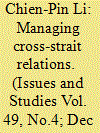

|
|
|
|
|
| Publication |
2013.
|
| Summary/Abstract |
The relationship between Taiwan and China has swung between periods of conflict escalation and de-escalation during the past two decades. In recent years, a notable trend of reconciliation has been observed amidst rising Taiwanese identity/attachment and public apprehension in dealing with China. This paper examines how the leadership in Taiwan frames public discourse and manages the tenor of cooperation and competition in public communication. Examining public speeches and interviews from 2004 to 2011 through the lens of value analysis reveals not only the substantive differences, but also the commonalities in rhetoric styles shown by Chen and Ma and their respective administrations. When facing different audiences, both administrations calibrate and adjust their messages. Sharp attacks against China are usually reserved for domestic audiences, while Taiwan's aspirations and accomplishments are showcased for foreign audiences. Furthermore, while their language toward China may be different in tenor of denunciation and accusation, the Chen and Ma administrations exhibit a similar tendency to appeal to the sense of Taiwan identity derived from in-group bias.
|
|
|
|
|
|
|
|
|
|
|
|
|
|
|
|
| 14 |
ID:
091528
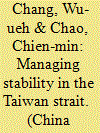

|
|
|
|
|
| Publication |
2009.
|
| Summary/Abstract |
China's Taiwan policy has been one of coupling intimidation (the stick approach ) with coercion (the carror approach ) a policy mix which, in the near term, is not likely to change, as is evidenced by the passage of the Anti-Secession Law in March, 2005.
|
|
|
|
|
|
|
|
|
|
|
|
|
|
|
|
| 15 |
ID:
095669
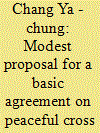

|
|
|
|
|
| Publication |
2010.
|
| Summary/Abstract |
In order to promote peaceful development in cross-Strait relations, this article proposes that both sides of the Taiwan Strait sign a "Basic Agreement on Peaceful Cross-Strait Development" - a temporary agreement (modus vivendi) to determine political relations and future development across the Strait. Three major points should be included in this agreement: first, both sides of the Taiwan Strait belong to one "Whole China" and both sides have no intention to separate from this "Whole China"; furthermore, both sides pledge not to split the "Whole China", but to work in unison to maintain the territorial integrity and sovereignty of the "Whole China"; second, both sides of the Taiwan Strait share constitutionally guaranteed equal relations, and normal relations across the Strait will develop on the basis of this constitutional equality; and third, both sides decide to establish communities in areas of common agreement in order to promote mutually cooperative relations.
|
|
|
|
|
|
|
|
|
|
|
|
|
|
|
|
| 16 |
ID:
117777
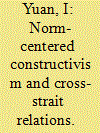

|
|
|
| 17 |
ID:
095556


|
|
|
|
|
| Publication |
2010.
|
| Summary/Abstract |
The US strategic ambiguity versus clarity has been a centerpiece in maintaining cross-strait stability since the 1995-96 Taiwan Strait crisis. Dialogues and debates abound regarding the relative effectiveness of discrete US policy choices. The current thaw in cross-strait relations does not forestall decisively the resurgence in the long run of the cross-strait tensions during 2000-08, rendering the strategic ambiguity/clarity still a relevant issue. This article argues that the discussions on the issue are seriously plagued by the lack of a sufficiently rigorous and commonly shared conceptualization of strategic ambiguity/clarity, and an internal logical contradiction or an inadequate practical utility as a tool to aid policy-making. To address these problems, this article seeks to clarify and elaborate on the conceptual foundation of strategic ambiguity/clarity by differentiating between two distinct analytic levels thereof, and proposing a conceptual framework for a fuller understanding of the US policy along various dimensions. It also reappraises some major issues or problems found in the existing discussions and US practice, and suggests possible solutions.
|
|
|
|
|
|
|
|
|
|
|
|
|
|
|
|
| 18 |
ID:
119216
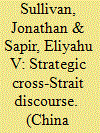

|
|
|
|
|
| Publication |
2013.
|
| Summary/Abstract |
Republic of China presidents Chen Shuibian and Ma Yingjiu have espoused substantially varied positions at different times on cross-Strait relations. Given the prominence of the presidents' rhetoric in an otherwise relatively stable relationship, these discursive fluctuations have been a cause of consternation and curiosity for observers of the cross-Strait relationship. However, their behaviour is consistent with democratic politics in general (issues and policy stances evolve and emerge, and political actors must engage and appeal to a wide range of stakeholders with varied agendas) and in terms of the growing influence of distinct sectors (such as big business) within Taiwan. This article puts forward a method for analysing this variation across three presidential terms, namely Chen's first and second term and Ma's first term. How does the content of both presidents' public pronouncements develop over time? How does the content of their discourse vary according to the strategic context of the constituency they are addressing? What does this reveal about the strategy and strategic relationships behind presidential rhetoric in Taiwan? In addressing these questions, the article contributes a quantitative perspective to existing work on political discourse in Taiwan and to the growing methodological and applied literature on how to systematically analyse Chinese political text.
|
|
|
|
|
|
|
|
|
|
|
|
|
|
|
|
| 19 |
ID:
108385


|
|
|
|
|
| Publication |
2011.
|
| Summary/Abstract |
The island of Taiwan has successfully managed 60 years of fast-paced economic growth. Taiwan is a demonstrably resilient player in the global economy, while also maintaining high levels of income equality. However, there is a great deal of uncertainty surrounding whether the factors that have enabled and sustained the Taiwanese development project thus far will be an adequate means of managing the contemporary challenges facing the island. Taiwan may be becoming increasingly vulnerable to global economic conditions, and the island's future seems also to be increasingly tied to developments in the Chinese mainland. This paper examines the prospects for a continuing Taiwanese growth paradigm from both a cultural and an economic perspective and finds reason for optimism. This optimism is contingent on the strength of international export markets and prudent management of cross-Strait relations with the Chinese mainland.
|
|
|
|
|
|
|
|
|
|
|
|
|
|
|
|
| 20 |
ID:
117936
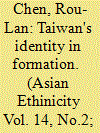

|
|
|
|
|
| Publication |
2013.
|
| Summary/Abstract |
The formation of Taiwanese identity is a good example to make sense of the theoretical debate between primordialism and constructivism. Based on the two-level multinomial logit results, this paper proves that primordial ethnicity in Taiwan becomes less salient; rather, changing sociopolitical contexts turn out to be the dominant factor in shaping ethnic identity. Specifically, it indicates how the democratic transition has brought about various types of mechanisms, which smoothly disenchant the dominant Chinese identity. As the Taiwanese renaissance emerges to take a leading role in Taiwan's political platform, ethnic identity might be reshaped in accordance with this mainstream Taiwanese ideology. This study also shows that reformation of ethnic identity in Taiwan relies as much on cognition of state boundaries as on the evaluation of political-economic conditions on both sides of the Taiwan straits.
|
|
|
|
|
|
|
|
|
|
|
|
|
|
|
|
|
|
|
|
|